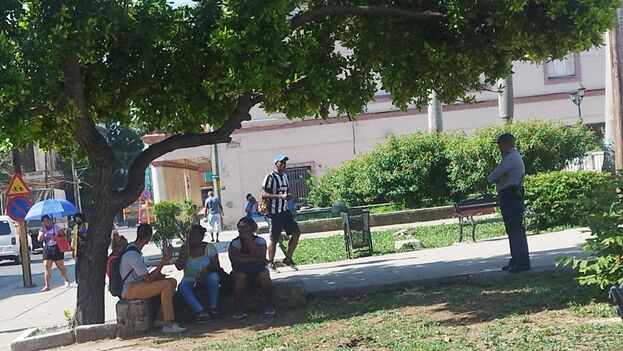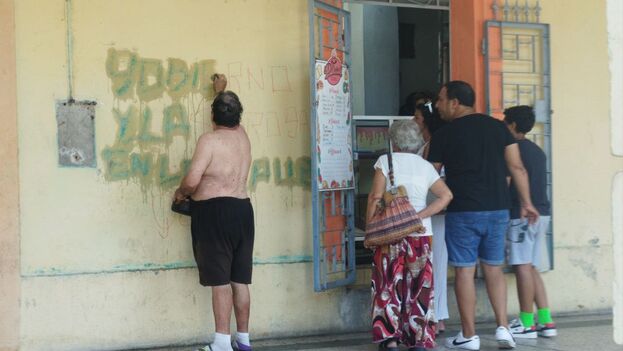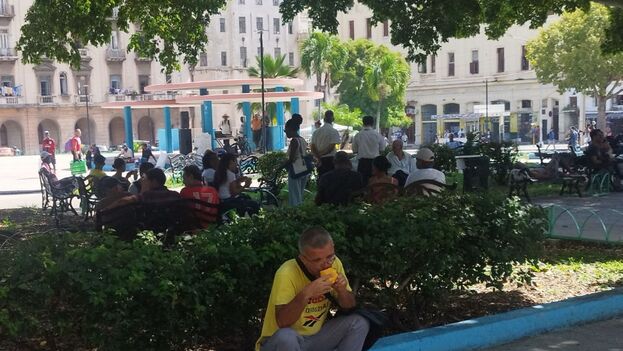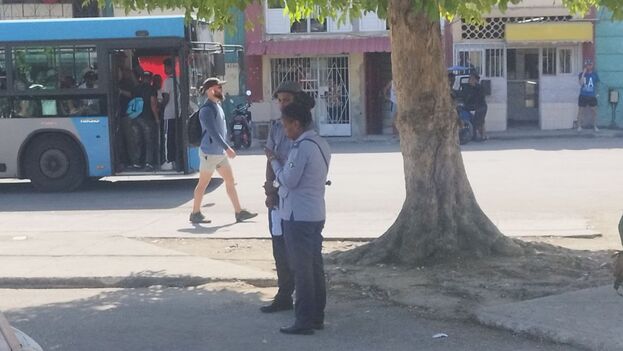
![]() 14ymedio, Juan Izquierdo, Havana, June 11, 2023 — Messages by phone, by word-of-mouth, and “orientations from above”: the tension in Cuban workplaces during the second anniversary of the ’11J’ — 11th July 2021 — protests began very early this Tuesday. In each school, in each company, someone had to remain “on guard” and with a club in hand to guarantee that no group – some friends, a desperate family, the entire neighborhood – would take to the streets like two years ago, in the face of food shortages, blackouts and the aggressive heat of the tropics.
14ymedio, Juan Izquierdo, Havana, June 11, 2023 — Messages by phone, by word-of-mouth, and “orientations from above”: the tension in Cuban workplaces during the second anniversary of the ’11J’ — 11th July 2021 — protests began very early this Tuesday. In each school, in each company, someone had to remain “on guard” and with a club in hand to guarantee that no group – some friends, a desperate family, the entire neighborhood – would take to the streets like two years ago, in the face of food shortages, blackouts and the aggressive heat of the tropics.
That the 14ymedio newsroom in Havana woke up under surveillance by State Security officers did not surprise anyone. Nor did the fact that its members’ internet and telephone services cut off. Nothing, however, prevented this newspaper from touring the capital to verify that, despite the government’s attempts to present an appearance of “happiness for a day,” the fear of protest was still there.
As often happens, the first blow to the fiction of wellbeing was the bungling of the officers themselves. Three white lines stained a wall on Carlos III avenue, between Oquendo and Marquéz González. The lines, desperately drawn on the side of a candy store a few days before, launched a question: “Government, what about the drugs on the street?”
The sign, which has gone from paint to a stain, and then to traces of lime, no longer even attracts the attention of the police and military. Signs like that “have become too common,” assessed one of the residents of Carlos III, who stops in front of the phrase without paying too much attention and defines a “life cycle” for them: write, scratch, cover.
“We’ll see when this pintadera is going to end ,” growled an old woman in front of the owner of the candy store, who was trying to erase – without much result – the letters, one by one. Leaving the place, another neighbor exclaimed jokingly: “Nothing like lime to bury the dead.”
Where the situation could easily get out of control is in one of the massive lines in front of food establishments and shops. If a police officer were to look at the group from afar, as a victim of a nervous breakdown and the mirages caused by the heat, he could mistake the line for a demonstration.

Vociferous, sweaty, hungry and jaded: this is how the Cubans of ’11J’ also marched, with demands that –as illustrated by their overwhelmed faces and resignation– have not been heard or resolved.
Anyone who avoids the crowd to sit in a park must also endure the harassment of the officers, both in uniform and in civilian clothes, for whom any public square is a battlefield where the hoarse voice of Miguel Díaz-Canel and his “battle array” reverberate.
The “boys” from the Ministry of the Interior walk, undisguised, through El Trillo park and the park on Belascoaín street, looking uneasily at whoever stretches out on a bench or takes out a cell phone in the Parque de la Fraternidad and, on the corner of the so-called Parque de El Curita, the harassment has reached such a point that no one dares to occupy a bench.
The farce has reached the limit of agents occupying the sidewalks disguised as Labiofam laboratory workers or ETECSA operators. As happened before the call to the Civic March for change on November 15, 2021, the youngest agents and the veterans form combined groups.
If someone happens to stop a few steps away from them and turns on their phone, it doesn’t take long for them to come over. Clumsily and making use of any excuse, they don’t stop looking at the screen: since long before the outbreak of 11J, the order not to record or expose the fear of the regime has also been given.

Not is the date is not forgotten outside of Cuba. The coalition of opposition organizations D Frente called on Tuesday to urgently seek “peace, freedom and well-being” for the Island. On the second anniversary of 11J – “a national civic demonstration that expressed rejection of a sociopolitical system that excludes, impoverishes and violent Cuban society” – D Frente wrote, recalling the meaning of that social outbreak and the balance of detainees, prosecuted and violated during those days.
The government of Miguel Díaz-Canel committed “a crime against the country,”,sums up the organization, which called for a reflection on the methods of “negligence and repression” that have become characteristic of the regime in recent years. “Cuba is dying on us,” it laments, due to the social hardship that burdens health, education, food, security and freedoms.
Without changes or hopes, D Frente foresees, nothing prevents a social explosion that restores plurality and well-being on the Island at any future date, as it did in July 2021.

____________
COLLABORATE WITH OUR WORK: The 14ymedio team is committed to practicing serious journalism that reflects Cuba’s reality in all its depth. Thank you for joining us on this long journey. We invite you to continue supporting us by becoming a member of 14ymedio now. Together we can continue transforming journalism in Cuba.
